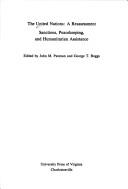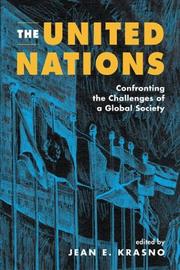| Listing 1 - 10 of 17872 | << page >> |
Sort by
|
Book
ISBN: 9782070338597 2070338592 Year: 2006 Volume: 251 Publisher: Paris Gallimard
Abstract | Keywords | Export | Availability | Bookmark
 Loading...
Loading...Choose an application
- Reference Manager
- EndNote
- RefWorks (Direct export to RefWorks)
Book
ISBN: 9782707182876 2707182877 Year: 2015 Volume: 145 Publisher: Paris : La Découverte,
Abstract | Keywords | Export | Availability | Bookmark
 Loading...
Loading...Choose an application
- Reference Manager
- EndNote
- RefWorks (Direct export to RefWorks)
Une perspective historique des principes, des mécanismes et des opérations de l'ONU depuis sa création. L'auteur démontre la nécessité de réformer l'institution, de réajuster ses méthodes, sa philosophie et explique les raisons de son impuissance à instaurer son rêve de paix mondiale, à éradiquer pauvreté et ignorance, et à faire respecter les droits de l'homme. ©Electre 2015
Book
ISBN: 9781509507443 9781509507436 Year: 2016 Publisher: Cambridge ; Malden, MA : Polity Press,
Abstract | Keywords | Export | Availability | Bookmark
 Loading...
Loading...Choose an application
- Reference Manager
- EndNote
- RefWorks (Direct export to RefWorks)
Seven decades after its establishment, the United Nations and its system of related organizations and programs are perpetually in crisis. While the twentieth-century's world wars gave rise to ground-breaking efforts at international organization in 1919 and 1945, today's UN is ill-equipped to deal with contemporary challenges to world order. Neither the end of the Cold War nor the aftermath of 9/11 has led to the "next generation" of multilateral institutions. But what exactly is wrong with the UN that makes it incapable of confronting contemporary global challenges and, more importantly, can we fix it? In this revised and updated third edition of his popular text, leading scholar of global governance Thomas G. Weiss takes a diagnose-and-cure approach to the world organization's inherent difficulties. In the first half of the book, he considers: the problems of international leadership and decision making in a world of self-interested states ; the diplomatic complications caused by the artificial divisions between the industrialized North and the global South ; the structural problems of managing the UN's many overlapping jurisdictions, agencies, and bodies ; and the challenges of bureaucracy and leadership. The second half shows how to mitigate these maladies and points the way to a world in which the UN's institutional ills might be cured. Weiss's remedies are not based on pious hopes of a miracle cure for the UN, but rather on specific and encouraging examples that could be replicated. With considered optimism and in contrast to received wisdom, he contends that substantial change is both plausible and possible.

ISBN: 081390529X Year: 1973 Publisher: Charlottesville : University Press of Virginia,
Abstract | Keywords | Export | Availability | Bookmark
 Loading...
Loading...Choose an application
- Reference Manager
- EndNote
- RefWorks (Direct export to RefWorks)

ISBN: 1588262553 1588262804 Year: 2004 Publisher: Boulder, Colo. ; London : Lynne Rienner Publishers,
Abstract | Keywords | Export | Availability | Bookmark
 Loading...
Loading...Choose an application
- Reference Manager
- EndNote
- RefWorks (Direct export to RefWorks)
Book
ISBN: 2707144088 9782707144089 Year: 2004 Volume: 145 Publisher: Paris : La Découverte,
Abstract | Keywords | Export | Availability | Bookmark
 Loading...
Loading...Choose an application
- Reference Manager
- EndNote
- RefWorks (Direct export to RefWorks)
Book
ISBN: 9780745659824 9780745659831 0745659829 0745659837 Year: 2012 Publisher: Cambridge : Polity,
Abstract | Keywords | Export | Availability | Bookmark
 Loading...
Loading...Choose an application
- Reference Manager
- EndNote
- RefWorks (Direct export to RefWorks)
Six decades after its establishment, the United Nations and its system of related agencies and programs are perpetually in crisis. While the twentieth-century's world wars gave rise to ground-breaking efforts at international organization in 1919 and 1945, today's UN is ill-equipped to deal with contemporary challenges to world order. Neither the end of the Cold War nor the aftermath of 9/11 has led to the "next generation" of multilateral institutions. But what exactly is wrong with the UN, and how can we fix it? Is it possible to retrofit the world body? In his succinct and hard-hitting analysis, Thomas G. Weiss takes a diagnose-and-cure approach to the world organization's inherent difficulties. In the first half of the book, he considers: the problems of international leadership and decision making in a world of self-interested states; the diplomatic difficulties caused by the artificial divisions between the industrialized North and the global South; the structural problems of managing the UN's many overlapping jurisdictions, agencies, and bodies; and the challenges of bureaucracy and leadership. The second half shows how to mitigate these maladies and points the way to a world in which the UN's institutional ills might be "cured." His remedies are not based on pious hopes of a miracle cure for the UN, but rather on specific and encouraging examples that could be replicated. With considered optimism and in contrast to received wisdom, Weiss contends that substantial change in intergovernmental institutions is plausible and possible. The new and expanded second edition of this well-regarded and indispensable book will continue to spark debate amongst students, scholars, and policymakers concerned with international politics, as well as anyone genuinely interested in the future of the United Nations and multilateral cooperation.
Book
ISSN: 22675353 ISBN: 9782724625455 2724625455 Year: 2020 Publisher: Paris : Presses de Sciences Po,
Abstract | Keywords | Export | Availability | Bookmark
 Loading...
Loading...Choose an application
- Reference Manager
- EndNote
- RefWorks (Direct export to RefWorks)
Souvent raillée par les États les plus puissants qui lui préfèrent le Conseil de sécurité ou le G20, l'Assemblée générale de l'ONU est le seul organe au monde à composition quasi-universelle (193 États en 2019) fonctionnant selon une règle procédurale démocratique (un État, une voix). Les auteurs de cet ouvrage ont mobilisé des observations de terrain, des entretiens et les sources de l'Assemblée elle-même (débats et résolutions des sessions, commissions et organes subsidiaires) pour dresser le portrait de cette tribune exceptionnelle. Où l'on découvre que, malgré toutes ses imperfections - la faible portée normative de ses résolutions en particulier - , session après session, l'Assemblée est le creuset dans lequel, depuis 75 ans, s'élaborent les références communes de notre planète.
Book
Year: 1971 Publisher: New York (N.Y.) : New York university press,
Abstract | Keywords | Export | Availability | Bookmark
 Loading...
Loading...Choose an application
- Reference Manager
- EndNote
- RefWorks (Direct export to RefWorks)
Book
Year: 1996 Volume: 3.02. Publisher: Paris : La Documentation française,
Abstract | Keywords | Export | Availability | Bookmark
 Loading...
Loading...Choose an application
- Reference Manager
- EndNote
- RefWorks (Direct export to RefWorks)
| Listing 1 - 10 of 17872 | << page >> |
Sort by
|

 Search
Search Feedback
Feedback About UniCat
About UniCat  Help
Help News
News